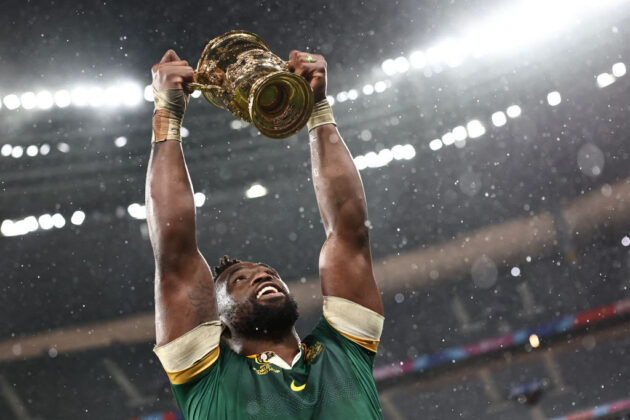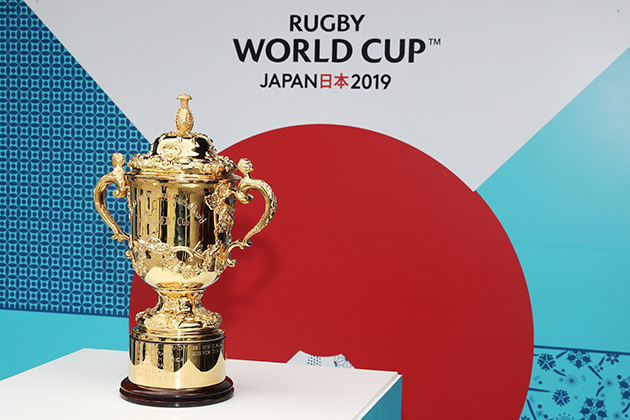We take a quick tour through the history of the Rugby World Cup by looking at the winners of the ten tournaments.
Rugby World Cup winners amount to four different nations across the ten tournaments. The latest edition was the 2023 Rugby World Cup was the tenth iteration of the tournament. New Zealand have won it three times and South Africa are the most successful nation, winning the trophy four times.
Australia have won it twice and England are the sole northern hemisphere nation to win the tournament back in 2003.
Below we tell the brief history of each tournament.
1987 – New Zealand beat France 29-9
The idea of a World Cup competition had been raised on more than one occasion in the 20th century but had consistently been rebuffed. However in 1985 a proposal was put in front of the IRFB (International Rugby Football Board – now World Rugby), and was passed by a vote of 10-6.
As a result, the first tournament was held in 1987 in Australia and New Zealand with 16 nations taking part.
Indeed it was the All Blacks who were the undeniable favourites to win the tournament and they delivered on that expectation comprehensively beating every opponent they faced including France in the final whom they beat 29-9.

Captain Fantastic: David Kirk scores a try in the final against France (Getty Images)
1991 – Australia beat England 12-6
Four years on and the tournament was held in a variety of countries with games being hosted in England, Scotland, Wales, Ireland and France.
Out of those five host countries, England went the furthest despite losing the opening match of the tournament against New Zealand. They squeaked out of the group, beat France at the Parc des Princes in the quarter-finals, and then Scotland at Murrayfield. Their reward for winning those two matches; a final against Australia.
Australia had just beaten the All Blacks in the other close semi-final and the final, held at Twickenham was also expected to be hotly contested. Going in at half-time the Aussies were ahead 9-0 thanks to a try by Tony Daly and a conversion and penalty kicked by Michael Lynagh.
Eventually the score became 12-3 before the most controversial incident of the game occurred with less than 15 minutes to go. England had an overlap and as Peter Winterbottom passed to Rory Underwood, Australian David Campese deliberately knocked the ball down. The referee waved away calls for a penalty try instead giving a penalty which Jonathan Webb slotted. The English did not score another point and the Wallabies were world champions for the first time.

Green and Gold: Australia win their first World Cup in 1991 (Getty Images)
1995 – South Africa beat New Zealand 15-12
The 1995 tournament was incredibly significant mainly because it saw the South African rugby side return to international competition after the IRFB readmitted them back in 1992 following the end of apartheid. As it turned out the tournament would be held in South Africa as well.
Led by Francois Pienaar, and with the force of a nation backing them up, the Springboks proved themselves to be a quality team beating defending champions Australia in the opening game. They then played their way all the way to the final where they would face the mighty All Blacks and the young star Jonah Lomu who had taken the game by storm.
Indeed heading into the final stopping Lomu was the main focus for the South Africans after the man mountain had scored four tries against England in the semis. As it turned out, that is exactly what they did as the game was dominated by the boots of Joel Stransky and Andrew Mehrtens who traded penalties and drop goals until it was 9-9 after 80 minutes.
New Zealand went quickly ahead in the first ever extra-time in World Cup Final history but Stranksy levelled with a penalty of his own. Then, with time winding down Stransky struck a pure drop-goal from 30-metres out that went through the posts and the trophy was theirs.
The 1995 tournament was also significant because only two months after the tournament ended, the IRFB opened game to professionalism and the game changed forever.

Pride of a Nation: Joel Stransky kicks the winning drop-goal in 1995 (Getty Images)
1999 – Australia beat France 35-12
Arguably one of the more forgettable World Cup tournaments, the 1999 edition was held in Wales and saw the Wallabies go up against France.
Australia had beaten South Africa in the semis 27-21 after extra-time, doing their best to nullify the drop kicking threat of Jannie De Beer, who had kicked five of them to knock England out of the tournament in the quarters.
France went up against the All Blacks and quickly fell 24-10 behind just after half-time. However the French quickly scored 33 unanswered points playing some sublime attacking rugby that the Kiwis had no answer for. The final score was 43-31 and Les Bleus were into their second World Cup Final.
Sadly they were unable to replicate that dashing attacking rugby as the Australians kept making attack after attack. Ultimately the Wallabies would win 35-12 in the most lopsided final score-wise ever.
Rugby World Cup Fixtures 2023
The Rugby World Cup 2023 fixtures concluded with…
Rugby World Cup Groups
A rundown of the Rugby World Cup groups…
2019 Rugby World Cup TV Coverage
Held in Japan for the first time, make…
2003 – England beat Australia 20-17
England were the favourites going into the 2003 tournament after beating New Zealand and Australia home and away in the year leading up to the tournament. They had also smashed South Africa 53-3 in the 2002 end-of-year internationals.
Shifting to the tournament, England, thanks to the boot of Jonny Wilkinson, pounded their way past their group matches and then Wales and France in the knockout stages. In a rematch of the 1991, the Red Roses would once again face the Wallabies in the final after they had beaten the All Blacks in the semis.
Like 1991, the 2003 match was also close as Elton Flatley kicked a penalty to send the match into extra-time. He and Wilkinson traded penalties again and then with time expiring Wilkinson famously kicked the drop-goal which made England the only northern hemisphere side to win the Rugby World Cup.

Golden Boy: Wilkinson kicks England to World Cup glory in 2003 (Getty Images)
2007 – South Africa beat England 15-6
Somehow, England would once again be in the final four years later against the Springboks. Having met earlier on in the tournament, where England had been utterly demolished 36-0, the final was excepted to be fairly one-sided. That couldn’t have been further from the truth.
Another match dominated by the boot, Wilkinson and Percy Montgomery scored all the points until Francois Steyn put the Springboks up 15-6 with 20 minutes to go. However there has been considerable debate on whether the margin should have been less as just after half-time Mark Cueto’s try was disallowed after TMO Stuart Dickinson ruled him to be in touch. A decision that could have gone either way, this time it went to the men in green and they closed out the rest of the match to win their second Rugby World Cup.

Within Inches: Mark Cueto scores but the try gets disallowed by the TMO back in 2007 (Getty Images)
2011 – New Zealand beat France 8-7
The tournament returned to New Zealand in 2011 and there was immense pressure on the home side to deliver a tournament victory.
New Zealand had not won the World Cup since 1987 and this revelation pushed many to say that the All Blacks were the best team in the world between World Cups, and then bottled it during the tournament.
The 2011 All Blacks side was believed to be different though. Led by Richie McCaw, the best player in the world, they strolled their way through the tournament including a brilliant performance beating Australia in the semis.
Their opponents would be their banana skin team, France. Thanks to a controversial red-card of Sam Warburton in the semis, Les Bleus narrowly defeated the Welsh 9-8.
The match was to be played at Eden Park and you could sense the nervousness in the stadium. The All Blacks were using their third string fly-half in Aaron Cruden after injuries to Dan Carter and Colin Slade so preparations were far from ideal.
Regardless they started well scoring a try through Tony Woodcock and a penalty from Stephen Donald, but they failed to produce any significant lead. Thierry Dusautoir then scored a try just after half-time to make the score 8-7. A massive battle of physical attrition, somehow neither team scored another point and the All Blacks were once again world champions.

Tournament Drought: New Zealand finally won the World Cup again in 2011 thanks to Woodcock’s try (Getty Images)
2015 – New Zealand beat Australia 34-17
With a new coach in Steve Hansen, the Kiwis once again found themselves in the final in 2015, this time against their traditional rivals Australia.
Having been the most dominant rugby team by a long way in years previously, the All Blacks were expected to run away with the trophy at Twickenham, and that was where the match was going after they stretched their lead to 21-3. However a Ben Smith sin-binning saw the Wallabies score two converted tries and they were within four with 16 minutes remaining.
Dan Carter put the lead to seven with a drop-goal and then ten with a penalty, before Beauden Barrett sealed the win with a try. As a result, New Zealand became the first team to win two World Cups in a row.
2019 – South Africa beat England 32-12
South Africa shut down England clinically and effectively to build a lead through Handre Pollard’s boot before late tries from Makazole Mapimpi and Cheslin Kolbe added gloss to the final scoreline – read a full match report here. The Springboks became the first team to win the World Cup after losing a match after being beaten in their opening by New Zealand.
2023 – South Africa defeated New Zealand 12-11
The Springboks were the defending champions of the tournament and had won their quarter-final and semi-final by a singular point. Heading into the final, fans knew whoever won would have the most men’s RWC trophies to their name with South Africa and New Zealand already having three each.
It was a close encounter and despite the All Blacks going down to 14 men with Sam Cane red carded, New Zealand continued to battle well. But in the end South Africa had too much to overcome and they lifted the trophy once more.
Follow our Rugby World Cup homepage which we update regularly with news and features.
Download the digital edition of Rugby World straight to your tablet or subscribe to the print edition to get the magazine delivered to your door.








